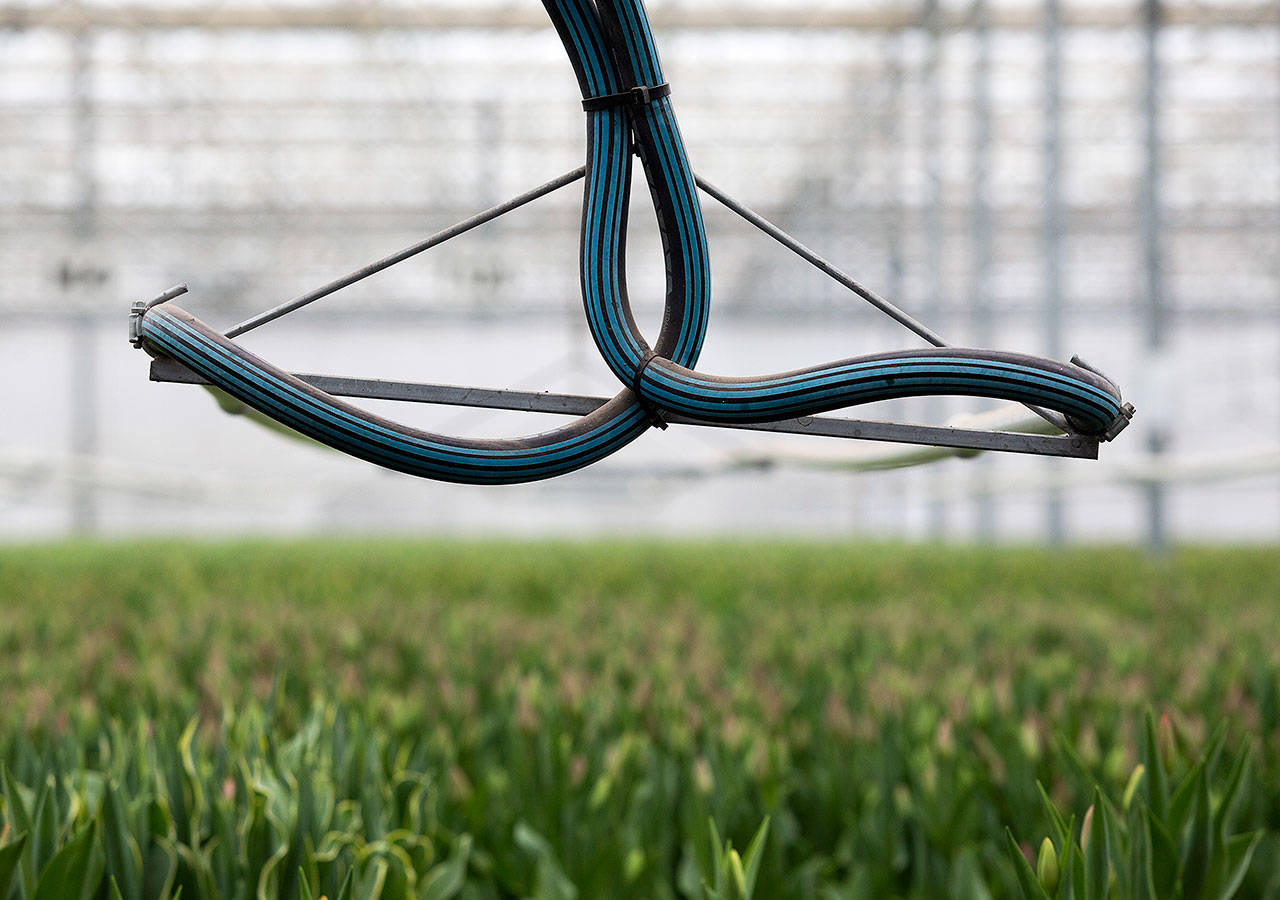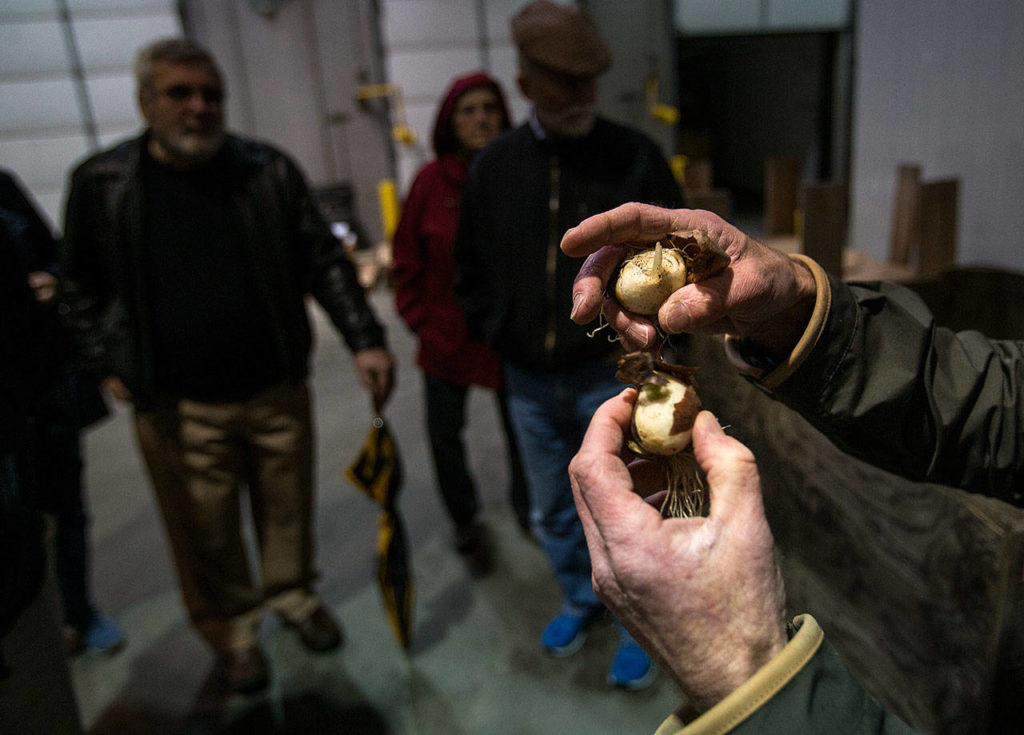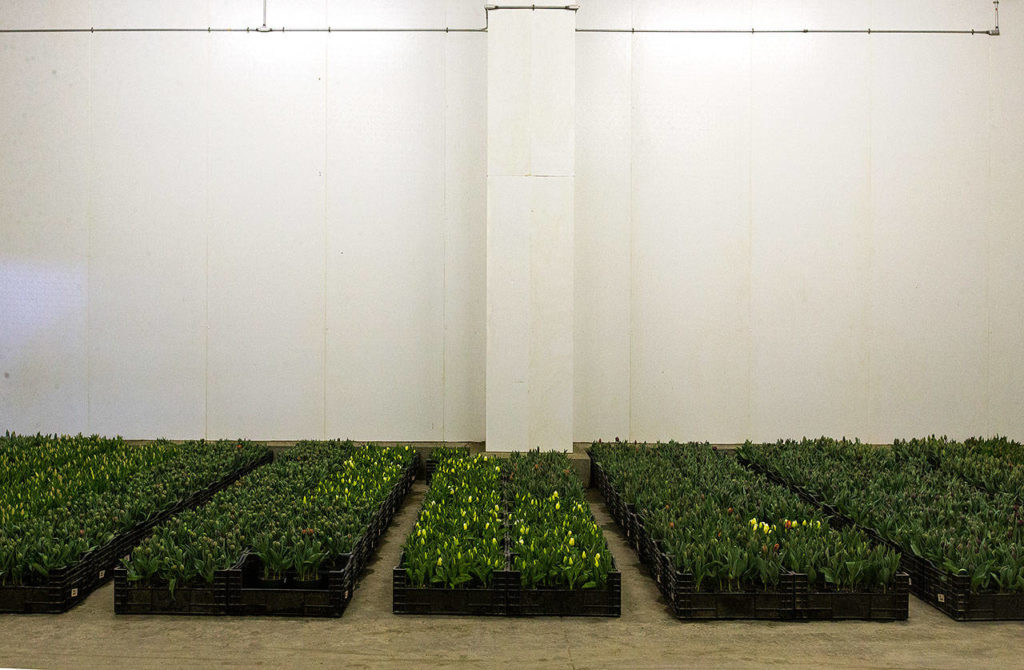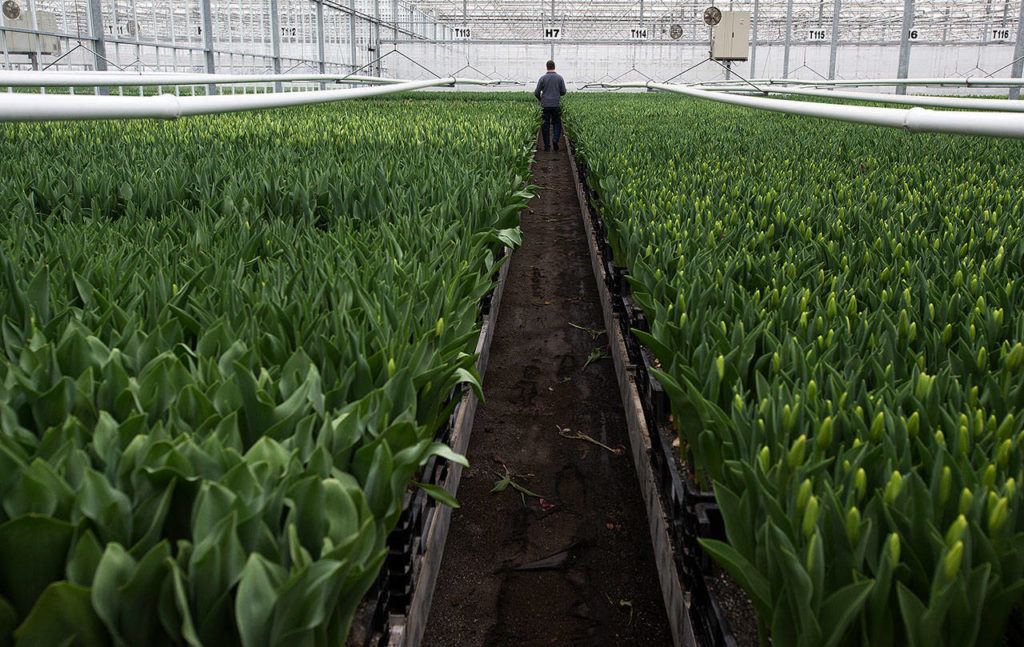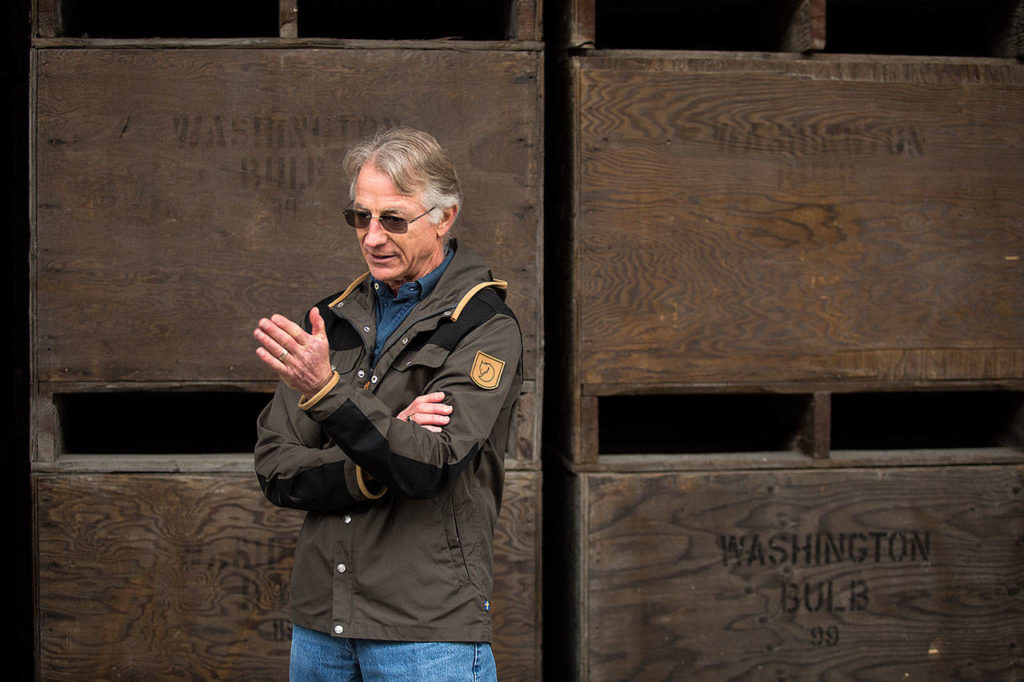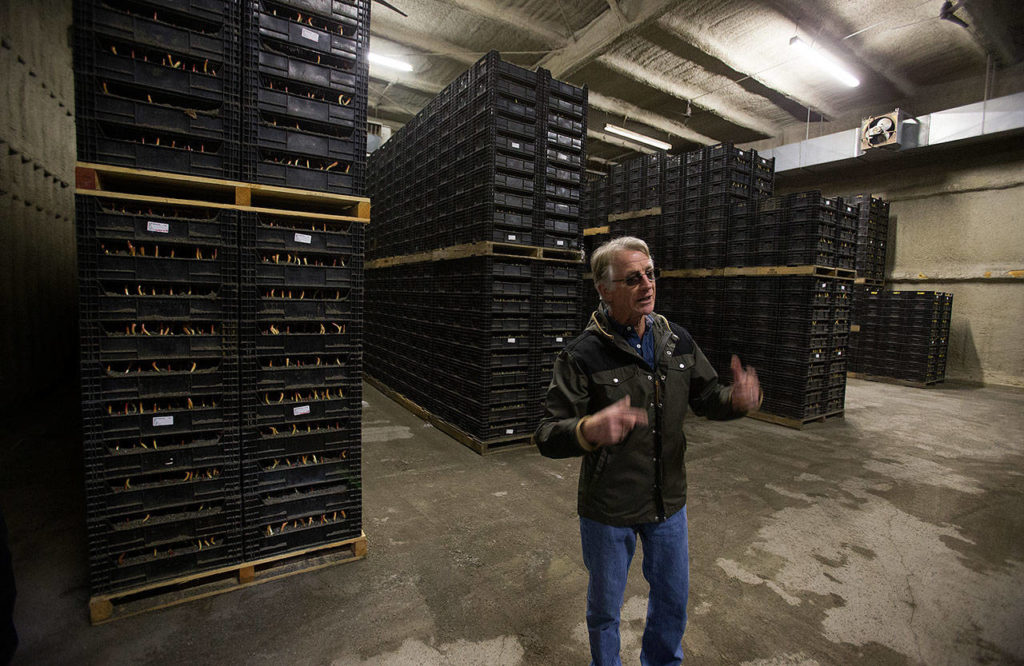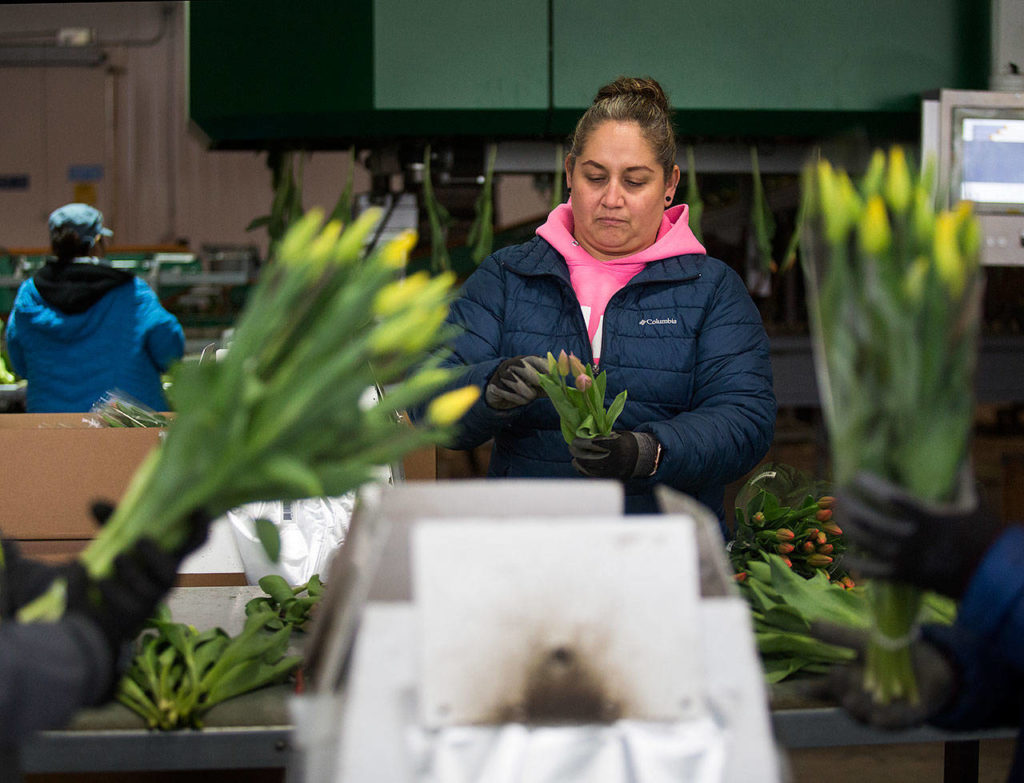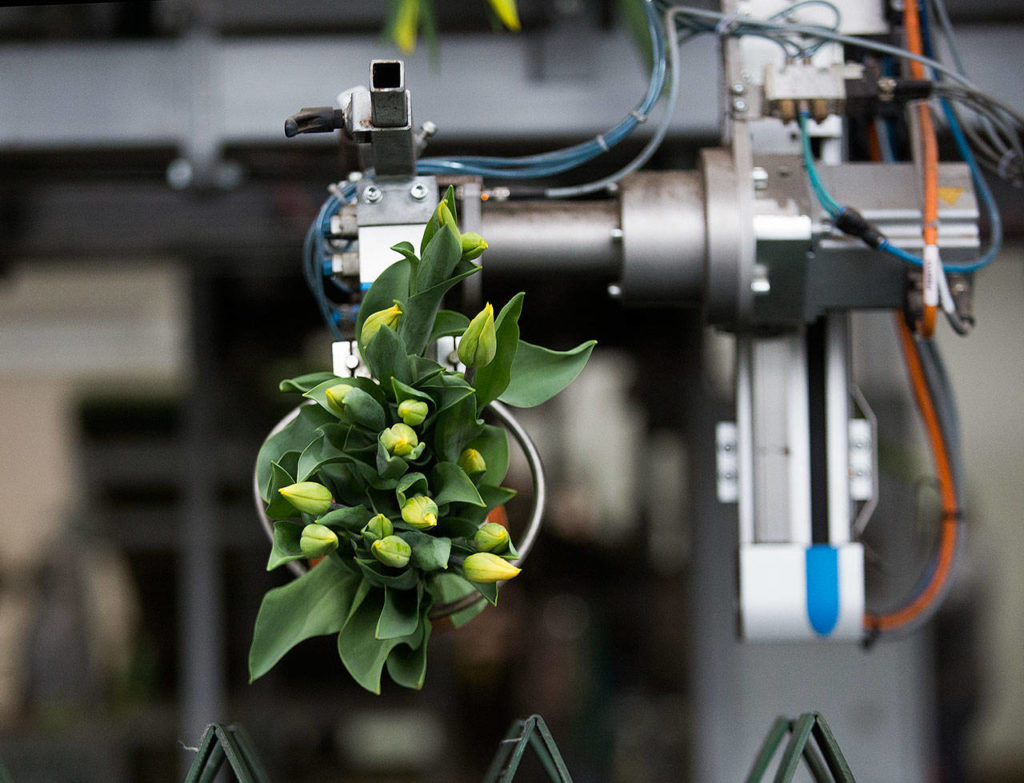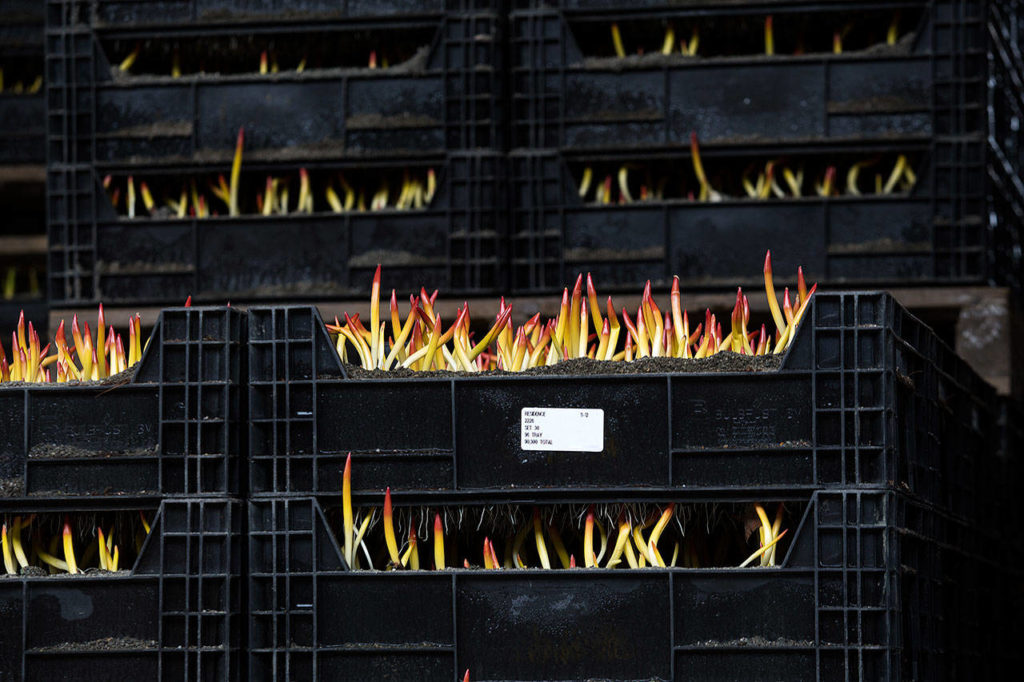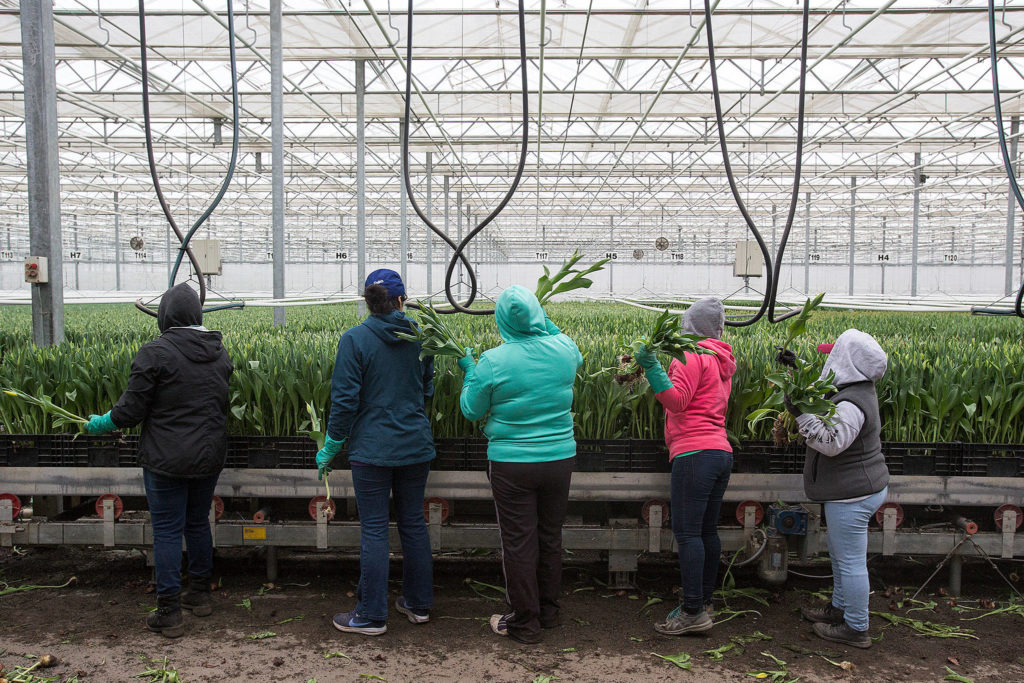MOUNT VERNON — People come to see the blooms at RoozenGaarde.
The colorful fields on Beaver Marsh Road are a magical playground for thousands of tourists during April’s Skagit Valley Tulip Festival.
All the while, another side of the flower action is in full swing next door, in a massive complex of nondescript buildings. It goes on long after the Skagit Valley back roads are barren and the snow geese take over.
The production complex, Washington Bulb Company, is in stark contrast to the vibrant acres of red, orange, pink, purple and yellow seen now. It’s off to the side yet in plain sight — that is, if you can take your eyes off the flowers.
The two distinct businesses are owned by the Roozen family.
RoozenGaarde, the retail division, is the public side of the enterprise, with a windmill, fields to stroll, gift shops and bouquets of fresh flowers so visitors can bring the magic home.
Washington Bulb Company is the wholesale operation of growing and shipping about 40 varieties of tulips. With 15 acres of climate-controlled greenhouses, plus warehouses and loading docks, it is as practical as the fields are pretty.
It is driven by commerce, not sightseeing.
“In the greenhouses, we cut 365 days a year,” said Leo Roozen, 66, president of Washington Bulb Company and a partner at RoozenGaarde with his brothers. “The flowers don’t know what day of the week it is, so we have to be there. We’re shipping cut flowers year-round.”
Many of the bulbs from all those pretty flowers that people take snapshots and selfies with at RoozenGaarde are sold or replanted by Washington Bulb Company.
The bulb company has between 200 and 250 workers.
The compound has building after building, each with a specific purpose in the flower chain of tulips and daffodils.
“They either come from Holland or out of our fields,” he said. “We are writing programs for 2020 now of what variety and how many we want to come in each week.”
For the Roozens, flowers are never out of season.
“People see the tulips and wonder what we do the rest of the year,” he said.
Bulbaceous
In the 170,000-square-foot greenhouse is a horizon of green plants as far as the eye can see.
Under the high glass ceiling, millions of plants are moved through stages of development using technology from the tulip masters in Holland.
Though a finely tuned automated system, the harvest relies on human hands to pluck the budding plants from the moving trays.
“They know exactly what stage to pick them,” Roozen said.
The budded plants are moved to cooling rooms until ready for the next step.
In the processing room, a machine cuts the bulbs from the plants. Another machine bunches the stems.
“The machines can grade. It can put five in a bunch or seven or 12,” he said.
Not only that, machines are so smart they can bunch plants by color.
“Machines can handle roughly 12,000 stems an hour,” Roozen said. “In the old days, it was physical manual labor.”
The stems are boxed, cooled and loaded in refrigerated trucks for distribution locally and nationwide.
“Most of our business is west of the Mississippi,” he said. “Where we can be most competitive is in our own backyard.”
Even then, it is a fraction of the flower business.
“Roughly 85 percent of the flowers that are purchased in this country come from offshore,” he said. “The biggest domestic production area is the state of California.”
The bulb company has continued to embrace new technology, which has enabled it to grow and survive.
Still, some old-time measures remain as safeguards, such as in the high-tech refrigeration rooms where plants are kept at 33 degrees.
“You don’t want to freeze anything,” Roozen said. “Any system, no matter how developed the technology, it can fail. You have a digital readout and you have a pretty expensive thermometer … and then you have this — a bucket of water.”
For real. A bucket of water is by the door.
“There’s no failure there,” he said.
Not just tulips
The Roozens own about 800 acres and lease 1,200 acres throughout the Skagit Valley.
“It’s an ideal climate for daffodils and tulips,” Leo Roozen said.
Leo’s brothers Richard, John and William are equal partners in the enterprise.
He and his wife of 42 years, Michele, a Marysville native, have three children. Their son, Brent, 37, is manager of RoozenGaarde, which is framed by 40 to 50 acres of tulips and daffodils.
“We redesign and replant every year,” Brent said. “It’s about a million bulbs by hand.”
Michele’s presence is more behind-the-scenes, where tourists flock. “I get things in working order,” she said. “And make things run smoothly. Hopefully.”
During tulip season, some 75 part-timers are cashiers, guides, greeters and parking attendants. Some are retirees, who come back to work every spring.
About five workers remain at RoozenGaarde after the crowds are gone. The store with all the cool tulip gifts stays open all year, and offers flower sales on site and online. The grounds are a venue for weddings and events.
Less than 2 miles from RoozenGaarde’s spread at 15867 Beaver Marsh Road is Tulip Town at 15002 Bradshaw Road.
Tulip Town was started decades ago by another Dutch family. It has a 10 acres of tulips, a 110-foot mural, gift shop, face-painting and kite-flying, said Jeannette DeGoede, co-owner with her husband, Tom.
“We stay open until the end of the Tulip Festival and then open again in the fall to sell our tulip bulbs,” she said. It is retail only. No daffodils.
Both places charge admission during the tulip festival: $7 on weekdays and $10 on weekends.
Tourists often confuse the two tulip wonderlands. Many simply follow the tulip road signs, park at the first one and are flat-out awestruck.
“They don’t always realize we are two different businesses,” DeGoede said. “They think with the RoozenGaarde ticket they can come into Tulip Town.”
“Heaven on earth” is how more than one online reviewer describes the fields during the festival.
The flowers are at the mercy of the heavens as well.
Some years are hell.
That “ideal climate” can turn on them. This year’s late snow doomed many daffodils, Roozen said.
The economy also factors in.
People must have food. “They don’t have to buy flowers,” Roozen said.
Flower power
Leo’s father, William A. Roozen, emigrated in 1947 from Holland, where his family had 200 years of experience in the tulip industry.
“He came to the Skagit Valley and said, ‘I can grow bulbs here,’” he said. He started a bulb farm on 5 acres, toiling long hours beside a few hired hands.
Leo was one of 10 kids who all worked on the farm. He and his four brothers all went to Washington State University, which is where he met Michele.
He planned to get out of the family business. Instead, after college he came back.
“I started out as a daffodil picker, at minimum wage,” Leo said.
The years went by. Some were good, some bad.
William Roozen prepared the next generation to take over.
“He was a big man,” he said. “He was 6-2 and handsome and he had an accent and he wore these dark glasses and he’d pull them down on his nose and look at you. He’d go, ‘You went to college. Figure it out.’”
His father died at age 81 in 2002.
“As a grower, he was good,” he said. “None of us could touch him, not even close. As a businessperson, too.”
Leo and Michele live a half-mile from the farm and have a getaway cabin in Tulalip. In April, there’s not much getting away.
Brent returned to work at RoozenGaarde after college. That was a dozen years ago. During tulip season this year, he became a father. Baby Riley has already joined him at work.
“I grew up working here,” Brent said last week, cradling his tiny son in his arms. “I never thought I’d work here the rest of my life.”
That’s what his dad said, too.
Andrea Brown: abrown@heraldnet.com; 425-339-3443. Twitter @reporterbrown.
Talk to us
> Give us your news tips.
> Send us a letter to the editor.
> More Herald contact information.
